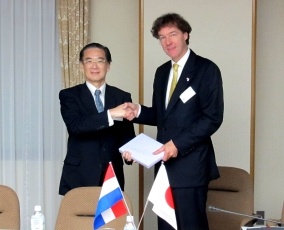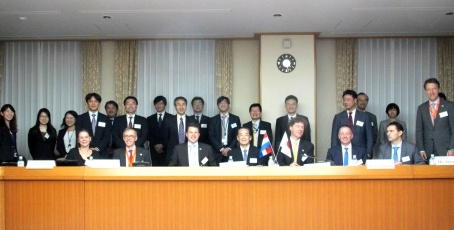Science and Technology
The 6th Japan-Netherlands Joint Committee on Cooperation in Science and Technology Joint Press Release
November 10, 2015


On November 10, 2015 in Tokyo, H.E. Makoto Katsura, Ambassador for Science and Technology Cooperation of the Ministry of Foreign Affairs (MOFA) of Japan, and Mr. Jasper Wesseling, Deputy Director-General, Enterprise and Innovation, Ministry of Economic Affairs (MEA) of the Kingdom of the Netherlands, co-chaired the 6th Japan-Netherlands Joint Committee on Cooperation in Science and Technology.
The Joint Committee Meeting (JCM) was held with participation of high-level representatives from the relevant ministries, funding agencies and research institutions of both countries and the Embassy of the Netherlands in Japan, and on the occasion of the visit of Prime Minister Rutte and Minister Kamp of Economic Affairs of the Netherlands to Japan. Both sides found the meeting a meaningful opportunity to reaffirm their commitment to intensifying cooperation in the fields of mutual interests, adding to the previous meetings which have been held since the entry into force of the bilateral agreement on Cooperation in Science and Technology in 1997.
In the JCM, both sides exchanged information and views on their science, technology and innovation (STI) policies; key thematic areas of mutual interest such as ICT/smart industry (focusing on quantum technology and cybersecurity), agriculture, and renewable energy and nuclear fusion; and framework for STI cooperation.
In the discussion on the STI policies, both sides emphasized the importance of innovation policy as a key to sustainable growth.
Exchanging views on ICT/smart Industry, both sides opted to review the recent development of their research activities in the fields of quantum technology and cybersecurity, as important areas for the bilateral cooperation, taking into account the international trends of the rapid advancement in these fields. They welcomed progress made in public-private partnership, which is exemplified by the case of cooperation between Control System Security Center (CSSC) of Japan and the European Network for Cybersecurity (ENCS).
In the area of agriculture, both sides shared information and insights on their research policies and situation on Japan-Netherlands research cooperation in horticulture and other fields of agriculture and food to accelerate innovation. They took note of the cooperation in the efforts to establish mechanisms for fostering collaborative research among Industry-Academia-Government. They also recognized the creation of enabling environment for the collaborative research between National Agriculture and Food Research Organization (NARO) and Wageningen University and Research Center (WUR) in this year. They reconfirmed the importance of continuous exchanges of knowledge and expertise in this area.
Both sides appreciated substantial progress of collaborative activities in the fields of renewable energy, such as off-shore wind, chemical conversion/storage, ocean energy and energy network in particular those in cooperation between Fukushima Renewable Energy Institute, AIST(National Institute of Advanced Industrial Science and Technology) (FREA) and the Energy Research Center of the Netherlands (ECN) based on the LOI. With regard to nuclear fusion, they also welcomed ongoing activities in the cooperation between National Institute for Fusion Science (NIFS) and Dutch Institute for Fundamental Energy Research (DIFFER).
Almost all of these key thematic areas were covered at the Japan-Netherlands events such as ''Quantum Computers and our Future Information Society forum'', ''Cybersecurity forum'' and ''Horticulture & Innovation seminar'', held on the occasion of the visit of Prime Minister Rutte and back to back to the JCM.
Under the session on framework for STI cooperation between research funding agencies, the JCM encouraged utilizing the programmes for researcher mobility provided by the Japan Society for the Promotion of Science (JSPS) based on the cooperation with the Netherlands Organisation for Scientific Research (NWO). Japan Science and Technology Agency (JST) reported the current status of the renewed CONCERT-Japan framework and encouraged the participation of NWO.
By highlighting the extensive relations in the field of STI through this constructive discussion, the co-chairs expressed their hope to contribute to the development of measures to effectively deal with global issues, mobilizing the full potential in their cutting-edge science and technology areas and encouraging dialogues among relevant institutions to further strengthen and expanding future partnerships.
The Joint Committee Meeting (JCM) was held with participation of high-level representatives from the relevant ministries, funding agencies and research institutions of both countries and the Embassy of the Netherlands in Japan, and on the occasion of the visit of Prime Minister Rutte and Minister Kamp of Economic Affairs of the Netherlands to Japan. Both sides found the meeting a meaningful opportunity to reaffirm their commitment to intensifying cooperation in the fields of mutual interests, adding to the previous meetings which have been held since the entry into force of the bilateral agreement on Cooperation in Science and Technology in 1997.
In the JCM, both sides exchanged information and views on their science, technology and innovation (STI) policies; key thematic areas of mutual interest such as ICT/smart industry (focusing on quantum technology and cybersecurity), agriculture, and renewable energy and nuclear fusion; and framework for STI cooperation.
In the discussion on the STI policies, both sides emphasized the importance of innovation policy as a key to sustainable growth.
Exchanging views on ICT/smart Industry, both sides opted to review the recent development of their research activities in the fields of quantum technology and cybersecurity, as important areas for the bilateral cooperation, taking into account the international trends of the rapid advancement in these fields. They welcomed progress made in public-private partnership, which is exemplified by the case of cooperation between Control System Security Center (CSSC) of Japan and the European Network for Cybersecurity (ENCS).
In the area of agriculture, both sides shared information and insights on their research policies and situation on Japan-Netherlands research cooperation in horticulture and other fields of agriculture and food to accelerate innovation. They took note of the cooperation in the efforts to establish mechanisms for fostering collaborative research among Industry-Academia-Government. They also recognized the creation of enabling environment for the collaborative research between National Agriculture and Food Research Organization (NARO) and Wageningen University and Research Center (WUR) in this year. They reconfirmed the importance of continuous exchanges of knowledge and expertise in this area.
Both sides appreciated substantial progress of collaborative activities in the fields of renewable energy, such as off-shore wind, chemical conversion/storage, ocean energy and energy network in particular those in cooperation between Fukushima Renewable Energy Institute, AIST(National Institute of Advanced Industrial Science and Technology) (FREA) and the Energy Research Center of the Netherlands (ECN) based on the LOI. With regard to nuclear fusion, they also welcomed ongoing activities in the cooperation between National Institute for Fusion Science (NIFS) and Dutch Institute for Fundamental Energy Research (DIFFER).
Almost all of these key thematic areas were covered at the Japan-Netherlands events such as ''Quantum Computers and our Future Information Society forum'', ''Cybersecurity forum'' and ''Horticulture & Innovation seminar'', held on the occasion of the visit of Prime Minister Rutte and back to back to the JCM.
Under the session on framework for STI cooperation between research funding agencies, the JCM encouraged utilizing the programmes for researcher mobility provided by the Japan Society for the Promotion of Science (JSPS) based on the cooperation with the Netherlands Organisation for Scientific Research (NWO). Japan Science and Technology Agency (JST) reported the current status of the renewed CONCERT-Japan framework and encouraged the participation of NWO.
By highlighting the extensive relations in the field of STI through this constructive discussion, the co-chairs expressed their hope to contribute to the development of measures to effectively deal with global issues, mobilizing the full potential in their cutting-edge science and technology areas and encouraging dialogues among relevant institutions to further strengthen and expanding future partnerships.

